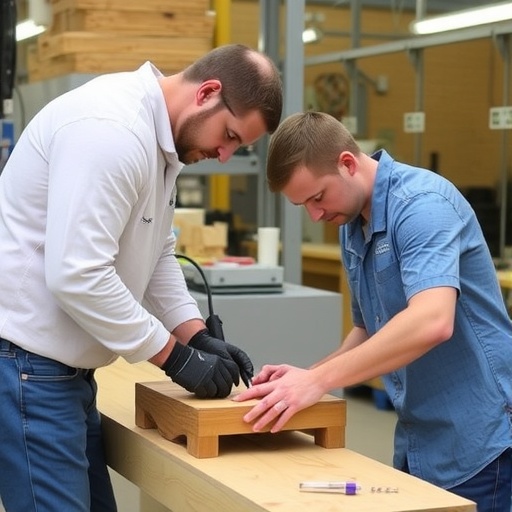A groundbreaking advancement is taking place at the University of British Columbia Okanagan (UBCO), where researchers are spearheading innovative techniques to enhance one of Canada’s most revered natural resources: Western red cedar. Known for its beauty, light weight, and resistance to decay, Western red cedar is a staple in construction and woodworking, yet its penchant for moisture absorption poses significant challenges. This new study aims to address that flaw through an unexpected method inspired by a technique used in medical science called plastination.
Plastination, the process originally devised to preserve biological specimens, is now being cleverly adapted to improve the durability and longevity of wood. Traditionally, the preservation of cadavers is accomplished through the replacement of bodily fluids with synthetic materials, creating a substance that maintains the form and structural integrity of biological specimens for educational and research purposes. In a similar manner, UBCO researchers are utilizing this remarkable technique to tackle water-related issues in wood, specifically in enhancing the performance of Western red cedar.
The process starts with a thorough dehydration of the wood using acetone—an organic solvent that efficiently replaces moisture within the wood’s cellular structure. Once the wood is adequately dried, it is infused with a compatible silicone polymer, which smoothly integrates into the microstructure of the cedar. This infusion creates a durable, hydrophobic barrier that not only protects the wood from rot and decay but also significantly reduces swelling caused by moisture absorption, thus enhancing its structural integrity.
Research led by doctoral student Olivia Margoto reveals that this method does not compromise the tensile strength of the wood. Under traditional treatments, the use of external coatings or chemical preservatives often results in a loss of the wood’s natural characteristics. However, plastination offers a novel approach that prioritizes the preservation of the wood’s fundamental properties while simultaneously augmenting its resistance to environmental factors that typically lead to deterioration. Margoto notes that the technique effectively preserves the anatomical architecture of the wood, resulting in a material that offers both strength and flexibility.
The team’s recent publication in the journal Materials outlines their findings and potential implications for the construction industry. The substantive reductions in water absorption—from nearly 60 percent, according to their advanced imaging and spectroscopy analyses—indicate that Western red cedar treated via this method exhibits significantly improved performance metrics. Furthermore, the enhanced surface hydrophobicity—greater than 45 percent—suggests that the treated wood could withstand harsher climatic conditions without succumbing to moisture damage, a crucial aspect for building materials used in North America.
This is particularly promising for the construction sector, where natural materials are increasingly sought after not only for their aesthetic appeal but also for their sustainable credentials. While many modern building practices lean heavily on synthetic materials, the integration of sustainably sourced wood that retains its natural virtues offers a compelling alternative. The application of plastination to wood further supports sustainability efforts, potentially circumventing the need for more toxic chemical preservatives that have long been a staple in the industry.
Dr. Abbas Milani, a professor in the School of Engineering and a supervisor on this project, defines plastination’s potential impact on wood preservation as transformative. He argues that this technique allows for sustainable growth in the use of natural wood products while maintaining an ecological balance that traditional methods often disrupt. By eschewing harmful chemicals in favor of a more natural approach, the researchers believe that plastination could redefine wood treatment processes for decades to come.
The ongoing collaboration with NetZero Enterprises Inc., a multinational leader in sustainable innovation, further emphasizes the project’s viability. Their partnership aims to integrate this novel method into commercially viable products, further enhancing the environmental performance of traditional materials in construction. This collaborative approach also opens avenues for ongoing research, focusing on the scalability of the plastination technique, solvent recovery processes, and the use of bio-based polymers as alternatives to conventional silicone.
In conclusion, the research team is on the cusp of transforming the understanding and practical applications of Western red cedar through advanced plastination techniques. As they explore larger-scale implementations of this method, the prospects look bright for introducing a new standard in wood preservation that not only extends the life of one of Canada’s most cherished resources but does so in an environmentally responsible way. As the methods evolve, the implications for construction materials, architectural innovation, and sustainable practices grow increasingly profound, promising a future where natural materials can thrive alongside modern engineering practices.
The journey to sustainable wood treatment is just beginning, and as Margoto aptly summarizes, “Nature has already given us incredible materials. Our job is to make them last longer in a safe, sustainable, and economical way.” With further exploration and implementation of their findings, UBCO is poised to lead this promising frontier that integrates science with ecological stewardship.
Subject of Research: Moisture management of Western red cedar through plastination.
Article Title: Towards a New Plastination Technique for Moisture Management of Western Red Cedar Without Loss of Strength and with Enhanced Stability.
News Publication Date: September 17, 2025.
Web References: DOI: 10.3390/ma18184353
References: None available.
Image Credits: Don Erhardt, UBC.
Keywords
Plasination, Western red cedar, wood preservation, sustainable materials, engineering, hydrophobic barrier, moisture management, construction materials, environmental performance, advanced composite materials, renewable resources, UBCO research.




